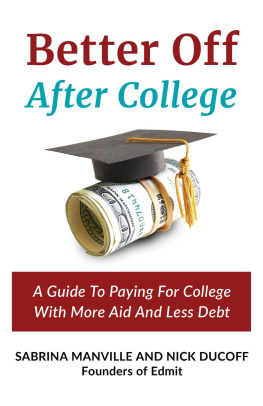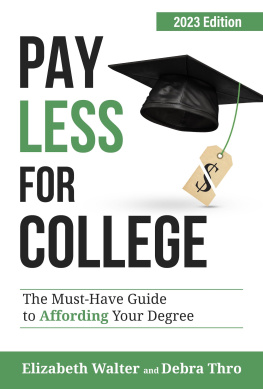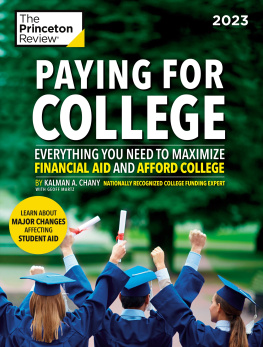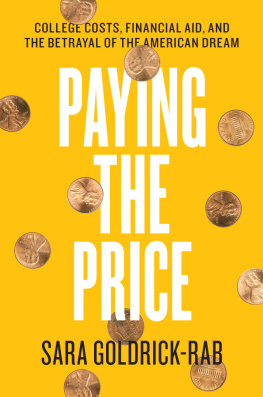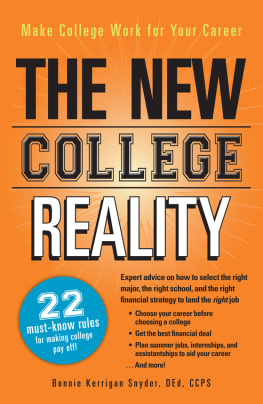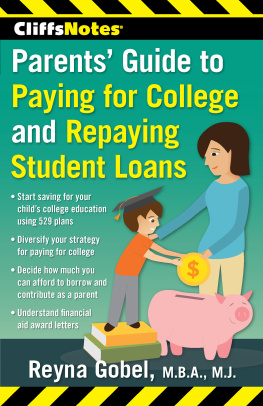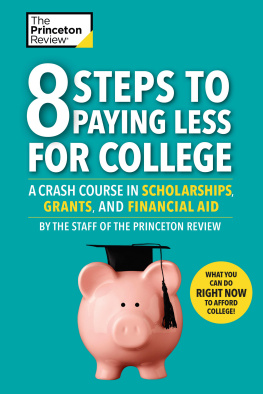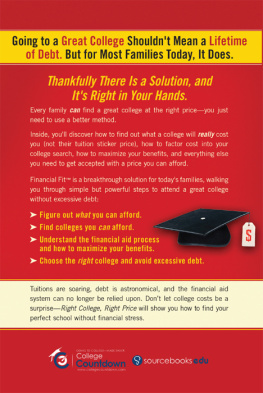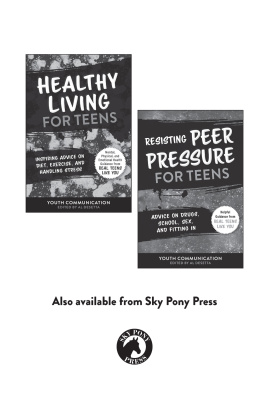In her latest book, The Complete Guide to Paying for College, Leah provides comprehensive information for students and parents on one of the most pressing financial issues of today. Her thorough coverage of the topic from a middle-class parents perspective is both authentic and exceptionally informative.
Clare K. Levison, CPA, author of Frugal Isnt Cheap
I will be clutching this book tightly and referencing it often. Leahs proactive approach, practical solutions and thorough lists of questions to answer at each step of the way will help all those bound for college. Reading it will make you feel like youre sitting at Leahs kitchen table and shes walking you step by step through the process, while you sip on your favorite tea or coffee. She will prepare you for the higher education financial journey. A must read for all parents and headed to college.
Erin Chase, author of $5 Dinner Mom Cookbook series
The Complete Guide to Paying For College examines every nook and cranny of how to afford the high and soaring cost of higher education. Leah offers practical solutions and easy to understand explanations for the various funding mechanisms and expenses that students and parents will face during the college experience.
Douglas A. Boneparth, CFP and coauthor of The Millennial Money Fix
Smartly paying for college without sacrificing your (or your childs) financial future can seem like an overwhelming task. You need a relevant, timely resource to help you put it all together. Thankfully, Leah Ingram has done just that in her new book. She covers it allfrom justifying the expense of higher education to spending wisely while there. Grab this guide and feel confident that youve got an upto-date, comprehensive tool to help you make the smartest financial decisions toward your college experience.
Philip Taylor, FinCon founder
This well-written and engaging book is a must-read for any parent who is worried about paying for college. If youre in the middle class, you often dont qualify for traditional financial aid. And trying to pay the sticker price for a degree isnt even a possibility. But now you have an easy-to-follow blueprint for financial survival during your kids college years. Money-saving expert, Leah Ingram, offers insider tips that show you how to save money and still give your child a quality education. This book is a great resource and it deserves a permanent spot on your nightstand.
Beverly Harzog, author, Confessions of a Credit Junkie and The Debt Escape Plan
Any parent looking for help figuring out how to pay for college will want to read Leah Ingrams book. The Complete Guide to Paying for College offers smart tips to keep tuition bills down and find ways to pay them as well as ideas for the students to save on college expenses after they enroll. I wish I had known them all before my sons launched their undergraduate years.
Richard Eisenberg, Money & Security Editor, PBS Nextavenue.org
Get the Education You Deserve at a Price You Can Afford
THE COMPLETE GUIDE TO PAYING FOR COLLEGE
Save Money, Cut Costs, and Get More for Your Education Dollar
LEAH INGRAM
Foreword by William J. Behre, PhD, Provost and Chief Academic Officer, Georgian Court University

Copyright 2018 by Leah Ingram
All rights reserved under the Pan-American and International Copyright Conventions. This book may not be reproduced, in whole or in part, in any form or by any means electronic or mechanical, including photocopying, recording, or by any information storage and retrieval system now known or hereafter invented, without written permission from the publisher, The Career Press.
THE COMPLETE GUIDE TO PAYING FOR COLLEGE
EDITED BY ROGER SHEETY
TYPESET BY KARA KUMPEL
Cover design by Rob Johnson/toprotype
Student photo by Andrey_Popov/shutterstock
Printed in the U.S.A.
To order this title, please call toll-free 1-800-CAREER-1 (NJ and Canada: 201-848-0310) to order using VISA or MasterCard, or for further information on books from Career Press.

The Career Press, Inc.
12 Parish Drive
Wayne, NJ 07470
www.careerpress.com
Library of Congress Cataloging-in-Publication Data
CIP Data Available Upon Request.
To Jane and Annie
Thank you for inspiring me to write this book.
Contents
Foreword
When Leah and I got married in 1992, I was a middle school teacher in New York Citys inner city. I grew up in a middle-class town in the suburbs and attended a prestigious liberal arts college. My education was worlds away from that of my students. The odds were against them completing high school, let alone going to college. That experience with those young people convinced me to go to graduate school to study education in order to better understand what struggles American youth face as they seek to further their educations. Not surprisingly, cost is a key impediment for many students.
Our family is fortunate. Leah and I make solid incomes. Still, having two children in college has put real stress on our household budget. That said, Ive never been more convinced that this investment is worth it. The experience our daughters are gaining from being at college cannot be replicated. And, Im not just talking about in-the-classroom experience. This year, for example, our older daughter is living with three women whose backgrounds couldnt be more different from her own suburban Pennsylvania up-bringing. Her roommates are a Latina from the Bronx, a Cuban immigrant, and a Muslim woman from Tunisia. Our younger daughter, who is pursuing a degree in engineering, spent last summer at a camp on her colleges campus, mentoring would-be young engineers. These interactions have exposed them to perspectives that you cant find in most other places. It has also opened them to career and learning options that they might never have considered. This expansion of possibility is the key reason I believe that college is worth it for most adolescents, despite its costs.
When they discuss the cost of college, many people limit its value to a simple financial return on investment. Will the student earn enough to justify the cost? Given the price tag, clearly, earnings have to be a consideration. And indeed, on average, college graduates earn substantially more than their non-college peers. But the conversation shouldnt end there. There is much more value in earning a college degree.
College-educated people are more likely to have other positive outcomes. They are less likely to get divorced. Researchers dont know for sure why this is, but there are some likely theories that help to explain this outcome. First, college-educated people tend to marry a bit later than their non-college peers, and they are less likely to have children out of wedlock. This means that for college-educated people, marriage may be a more deliberate, planned-out act. Most colleges also focus on communication skills and problem-solving. Anyone who has been in a successful marriage can speak to the value of these skills in navigating a successful relationship. Finally, personal finance is one of the greatest stressors in a marriage. Having a higher earning potential, which college provides, creates a greater chance of having adequate financial resources, which reduces this stress.
College-educated people also tend to live longer. Different sources offer different longevity estimates, which range between seven and 10 years higher than non-college peers. Again, no one can be certain why this is. Surely job choice has something to do with it. Many dangerous jobs do not require college degrees. Other explanations include the fact that college graduates (presumably due at least in part to the analytical skills they learned in college) are less likely to engage in dangerous behaviors, such as smoking, driving without seatbelts, or skipping regular checkups. College graduates are also more likely to report being happy, volunteer, take part in civic activities, and donate to charity. Yes, many of these positive outcomes can be linked to income. However, it is also very possible that in 21st century America, the act of attending college creates a greater awareness of the interconnectedness of people and the need to engage in something that is bigger than ones self. It helps young people to determine what they stand for. And as the old clich says, If you dont stand for something, you are likely to fall for anything.
Next page


